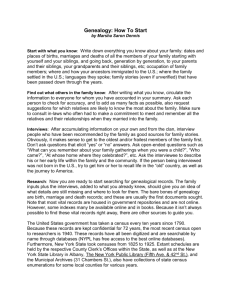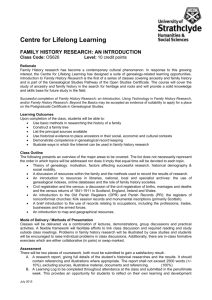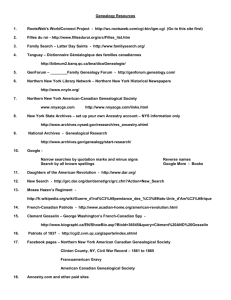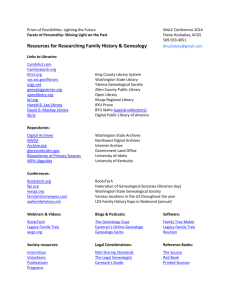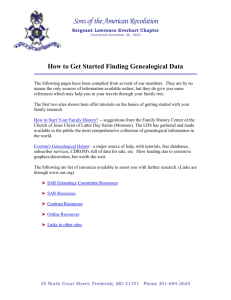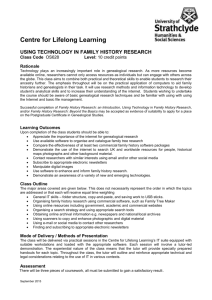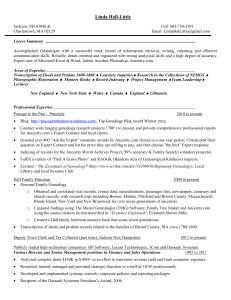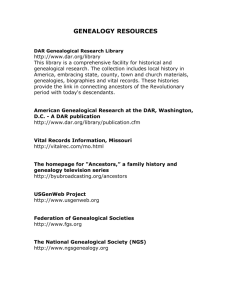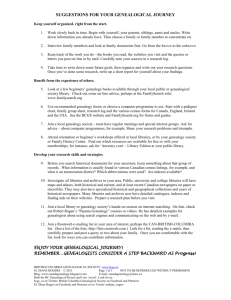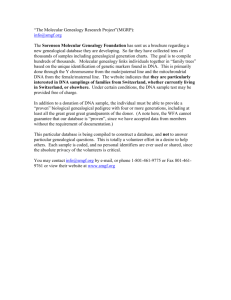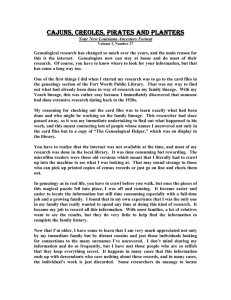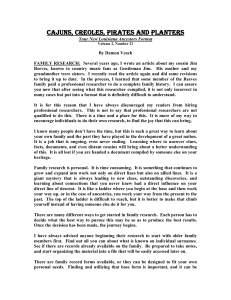The RootsTech 2011 Conference announced its keynote speakers
advertisement
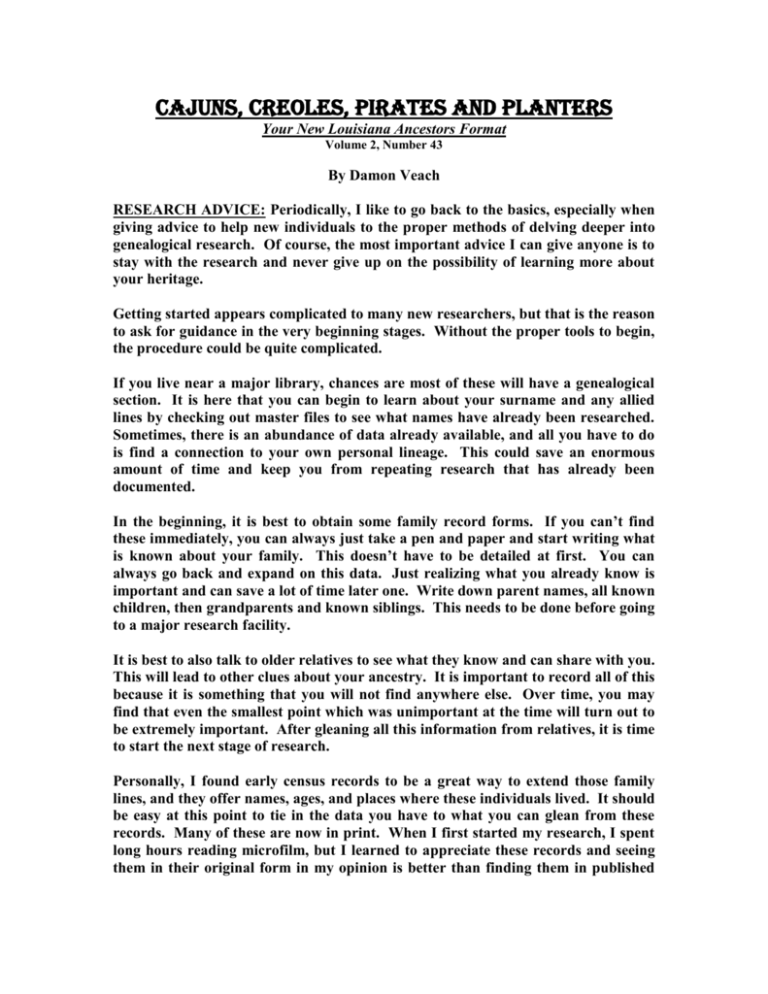
CAJUNS, CREOLES, PIRATES AND PLANTERS Your New Louisiana Ancestors Format Volume 2, Number 43 By Damon Veach RESEARCH ADVICE: Periodically, I like to go back to the basics, especially when giving advice to help new individuals to the proper methods of delving deeper into genealogical research. Of course, the most important advice I can give anyone is to stay with the research and never give up on the possibility of learning more about your heritage. Getting started appears complicated to many new researchers, but that is the reason to ask for guidance in the very beginning stages. Without the proper tools to begin, the procedure could be quite complicated. If you live near a major library, chances are most of these will have a genealogical section. It is here that you can begin to learn about your surname and any allied lines by checking out master files to see what names have already been researched. Sometimes, there is an abundance of data already available, and all you have to do is find a connection to your own personal lineage. This could save an enormous amount of time and keep you from repeating research that has already been documented. In the beginning, it is best to obtain some family record forms. If you can’t find these immediately, you can always just take a pen and paper and start writing what is known about your family. This doesn’t have to be detailed at first. You can always go back and expand on this data. Just realizing what you already know is important and can save a lot of time later one. Write down parent names, all known children, then grandparents and known siblings. This needs to be done before going to a major research facility. It is best to also talk to older relatives to see what they know and can share with you. This will lead to other clues about your ancestry. It is important to record all of this because it is something that you will not find anywhere else. Over time, you may find that even the smallest point which was unimportant at the time will turn out to be extremely important. After gleaning all this information from relatives, it is time to start the next stage of research. Personally, I found early census records to be a great way to extend those family lines, and they offer names, ages, and places where these individuals lived. It should be easy at this point to tie in the data you have to what you can glean from these records. Many of these are now in print. When I first started my research, I spent long hours reading microfilm, but I learned to appreciate these records and seeing them in their original form in my opinion is better than finding them in published records. Other than being quicker, I wouldn’t trade my first-hand experience for any of the new means of expanding my knowledge of family ties. In all of this, the thrill of finding an elusive ancestor is just one of the best experiences you can have in genealogical research. It makes all those long hours of research worthwhile. You are learning that one clue or one piece of information is giving you another piece of the giant puzzle that is called ancestry. I always loved American history, and even now as I continue my research, I find that my ancestors were a part of this. It makes me appreciate not only the fact that my ancestors participated in the early history of our country, but I feel a sense of pride with each new revelation. Again, this is the reason I don’t recommend professional researchers. There are instances where seeking help is definitely good, but to sit back and let someone else do all the work is just not my way of doing things. In all of this, I have to also stress accuracy in your work. Just because you uncover records, it doesn’t necessarily mean they are correct. That is what you have to do now – seek and find the truth. Spellings are the least worry since you can always figure these out, but dates and facts are things that you have to check thoroughly. Some researchers just aren’t as reliable as others, and even relatives may tell you one thing that you prove later on to be untrue – or altered. Therefore, it is your job to set the records straight. Of course, there are some records that are there for all time, and once you find something that you feel is incorrect, you just have to log it carefully in your own work and hope that future generations will realize that you have corrected something in earlier works. Remember that there are so many places locally where you can do research. Records can be found in land offices, churches, cemeteries, publications of historical and genealogical societies, and in columns such as this. It is very important to find out who else is researching your lines and perhaps work together to aid in completing individual lines. Even though you don’t have anything in common with other researchers, they may still have advice that will assist you in your own research. Don’t overlook these individuals or local places for finding clues to your ancestry. Now with the internet, it is much easier to locate information. This is a great way to located information on your family and to find others working on related lines. You will also find lots of pay sites. I don’t recommend these until you feel you have exhausted all other avenues of research. Leading publishers around the country also have books that will assist in helping you reach your research goals. The information is there. You just have to locate it. That is the overall joy of doing your own research. It is up to you to search out and record. Sharing along the way will assure that your information will not be lost. This sharing is part of the joy of genealogical research. It is your way of learning and sharing the history of your own family lineage. Good luck in this experience. XXX CONFERENCE SCHEDULED: The RootsTech 2011 Conference will be held February 10-12, 2011 in Salt Lake City, Utah. The national speakers reflect the conference’s focus on creating a forum where genealogy technology users can discover exciting new research tools and technology creators can learn the latest development techniques from industry leaders and pioneers. Here are the speakers scheduled for this conference: Shane Robison, Executive Vice President and Chief Strategy and Technology Officer for Hewlett-Packard Company; Brewster Kahle, Founder, The Internet Archive; Curt Witcher, Historical Genealogy Department Manager, Allen County Public Library; and Jay L. Verkler, CEO, FamilySearch International.. RootsTech is a new conference designed to bring technologists together with genealogists so they can learn from each other and find solutions to the challenges faced in family history research today. The conference’s activities and offerings are focused on content that will help genealogists and family historians discover exciting new research tools while enabling technology creators to learn the latest development techniques from industry leaders and pioneers. XXX FREE SERVICE: Correspondence to this column should be directed to Damon Veach, Cajuns, Creoles, Pirates and Planters, 709 Bungalow Lane, Baton Rouge, LA 70802-5337. The e-mail address is ancestorslaveach@cox.net. Queries and book reviews are printed as space permits, and you are encouraged to take advantage of this free service. Claitor’s Publishing can serve as a distributor for self-published genealogy titles. Go to their homepage for details on how you can obtain this excellent service.
